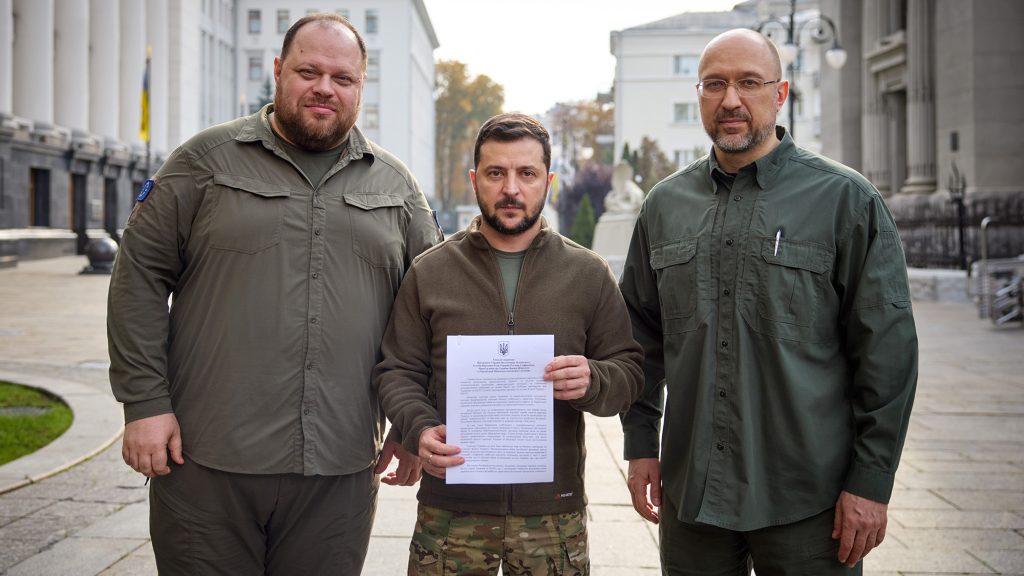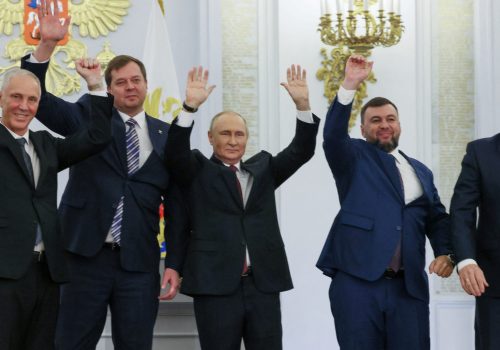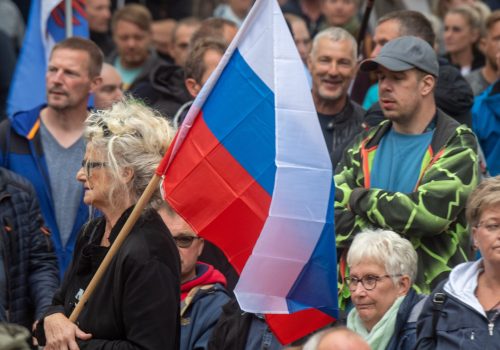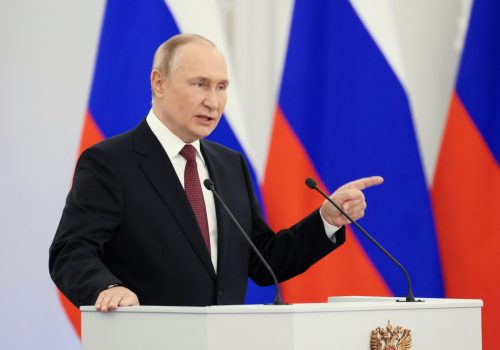Shortly after Russian President Vladimir Putin’s pomp-filled ceremony in a gilded Kremlin hall to mark the illegal annexation of occupied Ukrainian territory, his counterpart in Kyiv responded with his own bold gamble: Ukrainian President Volodymyr Zelenskyy announced that his country would apply for fast-track membership to NATO.
Prior to Putin’s brazen invasion of Ukraine on February 24, that prospect was thought to be off the table. But now that Ukrainian forces have proven themselves capable of beating back Russian troops, could the Alliance come around?
We asked the Atlantic Council’s NATO watchers to weigh in on whether Kyiv could join the military club.
From what we’ve seen in recent months, does Ukraine have what it takes to join the Alliance?
If you start with the premise that a major criterion for joining NATO is the proven ability to kick the butts of invading Russians, there is no better candidate than Ukraine (although Finland would point to the Winter War). And while that may sound tongue-in-cheek, the Ukrainian military is conducting a master class on how to best the Russians conventionally and in the information space—and NATO is learning from it. That this is, of course, being done with intensive planning and material support from NATO allies only reinforces Zelenskyy’s point that Ukraine has “proven [its] compatibility with alliance standards.” And while battlefield considerations are not likely to be decisive, from a strictly operational perspective, Ukraine clearly deserves a seat at the table.
—Christopher Skaluba, director of the Transatlantic Security Initiative in the Scowcroft Center for Strategy and Security
Ukraine’s desire to join NATO is not new, but Ukraine is arguably further away today from NATO membership than it was on February 23. The prospect of NATO membership is of course one of the many reasons Putin invaded Ukraine in the first place. The Ukrainian government is clearly ratcheting up the pressure on Moscow in response to increased pressure from Russia through the referendums and Putin’s unhinged speech. The issue is not Ukraine’s ability to meet NATO standards. The issue is that Ukraine is at war with Russia and the same NATO members that are not doing everything in their power already to ensure Ukrainian victory are not going to support entering into a formal alliance with Ukraine that would require them to legally commit to Ukraine’s defense.
—Leah Scheunemann, deputy director of the Transatlantic Security Initiative in the Scowcroft Center for Strategy and Security, former Pentagon official focused on international security policy
How will Zelenskyy’s surprise move be received among NATO members?
Officially, NATO members will reinforce the Alliance’s open-door policy and welcome the application of any democratic European nation, just as Secretary General Jens Stoltenberg did in response to a question at today’s press conference. Unofficially, it’s causing heartburn on two fronts. First, it is rightly being seen as escalatory in a conflict in which managing escalation has been a primary concern for many of the major actors, the United States most prominently. Second, it is again highlighting NATO’s fifteen-year impotence on this front since promising that Ukraine and Georgia “will become members of NATO” at the 2008 Bucharest Summit. There was already talk in NATO circles about how to show progress on Ukraine’s membership aspirations by the time of next summer’s Vilnius Summit. That timeline has just been expedited.
—Chris
The lack of immediate comment from NATO shows that this move was uncoordinated and in response to the sham illegal referendums that represent Moscow’s attempt to scare Ukraine into a ceasefire. Zelenskyy’s statement that Ukraine is de facto part of NATO is key: Putin needs to understand that Ukraine and NATO will respond if Russia continues to escalate the conflict, including the increasing nuclear threats. Zelenskyy mentioned the cases of Finland and Sweden, which both support the continued open-door policy of NATO—having only recently decided to take advantage of it themselves. However, supporting NATO’s open-door policy and actually admitting Ukraine into the Alliance are very different things. NATO is not ready as a whole to act on Ukraine’s application.
—Leah
What would Ukraine need to do to boost its chances of a successful candidacy?
Keep winning and keep up the pressure. Those two factors are inexorably linked, as Zelenskyy has masterfully used Ukraine’s battlefield success as a platform to demand more from Western supporters. Many allies have gone well past their original intentions of how much and what kind of material support to give to Ukraine based on Ukrainian achievements and Zelenskyy’s unparalleled ability to cajole, name, and shame. The recipe is the same here.
—Chris
Under the accelerated accession process that Finland and Sweden are following as they move toward NATO membership, Ukraine could also technically move much faster than other countries have in past processes that formally took years. However, the main issue is that there is no recent precedent for NATO accepting a new member that is under partial occupation. Another concern is that Article V, or the collective-defense clause of NATO’s treaty, would require all members to come to Ukraine’s aid. While this is not automatic and needs to be unanimously agreed to by NATO’s members, the same members that would oppose triggering Article V would likely oppose Ukraine’s formal membership as well. In the meantime, NATO members can offer Ukraine security assurances, like many have done for Sweden and Finland, that would go beyond current arrangements. The larger issue is that the West needs to step up its military support to Ukraine, supplying it with longer-range munitions, more air-defense systems and tanks, and whatever other capabilities are required to ensure Ukraine’s victory as urgently as possible.
—Leah
Further reading
Fri, Sep 30, 2022
Russia has again tried to change Europe’s borders by force. What’s next?
Fast Thinking By
Our experts map out what to expect after Putin's latest major escalation.
Wed, Sep 28, 2022
The economic response that can match Putin’s escalation in Ukraine
New Atlanticist By Brian O’Toole, Daniel Fried
The G7 and the wider West have done a solid job targeting the Russian economy. Now, they need to keep up the pressure.
Fri, Sep 30, 2022
Putin denounces imperialism while annexing large swathes of Ukraine
UkraineAlert By Peter Dickinson
Russian President Vladimir Putin has officially annexed four regions of Ukraine while denouncing Western imperialism and proclaiming Russia as the leader of a global "anti-colonialism movement."
Image: Ukrainian President Volodymyr Zelenskyy holds an application for accelerated accession to NATO, next to Ukrainian Prime Minister Denys Shmyhal and the head of Verkhovna Rada Ruslan Stefanchuk. Photo via the Ukrainian Presidency/Reuters.



